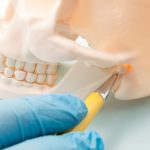Before even discussing the most common causes of dental implant problems, it is worth noting that the success rate for this type of maxillofacial surgery is 97%.
Nevertheless, an informed patient is in a better position to make an appropriate choice when it comes to dental surgery. This is why it makes sense for implantologists to want to educate people about the common causes of dental implant problems.
Implant osseointegration failure
Osseointegration refers to the period during which the titanium dental implant posts will fuse with the jaw bone, becoming an integral part of the patient’s anatomy. Failed osseointegration usually occurs due to a lack of bone density in the area of the jaw where the implant will be placed.
If the jawbone density isn’t high enough to support an implant, a maxillofacial surgeon can solve the problem by performing a dental bone graft. For example, a bone graft can be performed to fill the sizeable hole left after extracting an incisor. This procedure prevents the gum from collapsing and provides enough density to hope for good osseointegration.
Infection after the dental implant placement
Infection is the most common cause of implant failure in most implant clinics. In fact, this type of problem is closely related to the patient’s oral hygiene following dental surgery. Indeed, a patient who neglects brushing his teeth daily and flossing regularly will have a greater chance of his implant becoming infected.
Smokers are also at greater risk because smoke, like poor oral hygiene, complicates the implant’s healing process. In short, to avoid developing a disease such as peri-implant mucositis and having to remove an implant, the patient must be disciplined and keep their mouth clean.
The body’s rejection of the titanium implant
This type of problem isn’t as common as infection and has nothing to do with the quality of the procedure. However, this is a phenomenon that can force the implant to be removed. In the vast majority of cases, the human body doesn’t consider titanium as a foreign substance and therefore accepts the dental implant as easily as a real tooth root. However, implant rejection should be considered as a possibility, as well as an allergic reaction to titanium.
Damage to the patient’s nerves
This cause of dental implant process failure isn’t really likely to happen unless the maxillofacial surgeon misjudges the position of the nerves in the patient’s jaw. If an implant is placed too close to them, the patient may experience severe pain and unpleasant numbness, forcing the implant to be removed.
Implantology at Clinique MFML
If you or someone close to you is considering dental implant placement, don’t hesitate to make an appointment with us. Our maxillofacial surgery clinic and our surgeons welcome you to analyze your situation, propose solutions and support you throughout your treatment.




